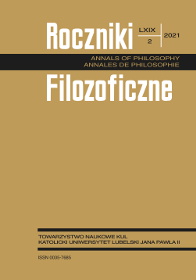Człowiek wobec świata zwierząt w ujęciu Roberta Spaemanna
Abstrakt
W artykule przedstawiono niektóre wątki interesujących analiz filozoficzno-etycznych Roberta Spaemanna na temat świata zwierząt, podejmowanych przezeń w duchu arystotelesowskim. Dotykają one kwestii, które wydają się być szczególnym przedmiotem zainteresowania zarówno znawców zagadnienia, jak i współczesnego człowieka. Są to: natura (jej specyfika) i status ontyczny zwierząt, cierpienie i jego źródła (m.in. eksperymenty i tresura), zabijanie tych stworzeń oraz jedzenie ich mięsa.
Spaemann nie tylko nie podważał, ale w duchu myśli klasycznej i współczesnej (Helmuth Plessner) oryginalnie podkreślał istotową wyższość człowieka nad zwierzęciem. Czynił to m.in. przez zaakcentowanie zdolności człowieka do samorelatywizacji.
Według wybitnego myśliciela niemieckiego zasady etyczne normujące nasze odniesienie do zwierząt łączą się ściśle z metafizycznym rozumieniem ich bytowości. Zasady te bowiem mają swoją podstawę w teleologicznej naturze naszych mniejszych braci i podmiotowej formie ich egzystencji. Spaemann akcentował rolę życzliwości, odpowiedzialności i troski, utylitarystyczną zasadę rachunku korzyści i strat, imperatyw kategoryczny Kanta oraz normę personalistyczną. Natomiast obowiązek ochrony zwierząt i odpowiedzialności za nie rozwijał w kontekście godności ludzkiej.
Podjęto próbę wykazania, jak doniosła jest teleologiczna perspektywa, której nikt tak wyraziście i przekonująco nie ukazał w odniesieniu do zwierząt we współczesnej niemieckiej filozofii jak właśnie Spaemann. Dokonano także porównania jego stanowiska na temat świata zwierzęcego z wizją Petera Singera. Przede wszystkim w artykule podjęto próbę rekonstrukcji Spaemanna myśli dotyczącej etycznych i metafizycznych aspektów stosunku człowieka do zwierząt.
Bibliografia
Anzenbacher, Arno. 2008. Wprowadzenie do etyki. Tłum. Juliusz Zychowicz. Kraków: Wydawnictwo WAM.
Arystoteles. 1972. O duszy. Przekład, wstęp i komentarz Paweł Siwek. PWN, Warszawa: PWN.
Arystoteles. 1995. O rodzeniu się zwierząt. W: idem. Dzieła wszystkie. T. 4. Warszawa: Wydawnictwo Naukowe PWN.
Bentham, Jeremy. 1958. Wprowadzenie do zasad moralności i prawodawstwa. Tłum. Bogdan Nawroczyński. Warszawa: PWN 1958,
Ferry, Luc. 1995. Nowy ład ekologiczny. Drzewo, zwierzę i człowiek. Tłum. Hanna Miś i Andrzej Miś. Warszawa: Centrum Uniwersalizmu przy Uniwersytecie Warszawskim.
Gilson, Étienne. 1960. Tomizm, Wprowadzenie do filozofii św. Tomasza z Akwinu. Tłum. Jan Rybałt. Warszawa: Instytut Wydawniczy PAX.
Gottwald, Franz-Theo. 2004. Geschöpfe wie wir. Hrsg. von der Allianz für die Tiere in die Landwirtschaft. München: Verlag, Gesellschaft für ökologische Kommunikation.
Gruen, Lori. 2002. Zwierzęta. W: Przewodnik po etyce, red. Peter Singer. Tłum. Robert Pucek, Paweł Łuków, Wojciech J. Bober i in. Warszawa: Książka i Wiedza.
Ingensiep, Hans W., i Haike Baranzke. 2008. Das Tier. Grundwissen Philosophie. Stuttgart: Reclam.
Kożuchowski, Józef. 2006. Spór o człowieka we współczesnej filozofii niemieckiej. Pelplin: Bernardinum.
Kożuchowski, Józef. 2013. O człowieku i moralności w filozofii Roberta Spaemanna. Lublin: TN KUL.
Kożuchowski, Józef. 2020. „Godność ludzka a prawa człowieka w ujęciu Roberta Spaemanna”. Studia Philosophica Wratislawiensia 15, fasc. 1: 131–145
Krąpiec, Mieczysław A. 1998. Byt materialny żyjący. Niektóre aspekty filozofii przyrody. W: idem. Wprowadzenie do filozofii. Wyd. 2 poszerz. Lublin: RW KUL.
Plessner, Helmuth. 1988. Pytanie o conditio humana. Wybrał, oprac. i wstępem opatrzył Zdzisław Krasnodębski. Tłum. Małgorzata Łukasiewicz i Andrzej Załuska. Warszawa: PIW.
Precht, Richard David, i Robert Spaemann. 2018. „Dürfen wir die Tiere essen?” www.youtube.com (watch?v=k7kg7HVBQ).
Probucka, Dorota. 2013. Filozoficzne podstawy idei praw zwierząt. Kraków: Universitas.
Rümelin Nide, Julian. 1996. Tierethik I: Zu den philosophischen und ethischen Grundlagen des Tierschutzes. W: Angewandte Ethik. Stuttgart: Alfred Kröner Verlag.
Schönberger, Rolf. 2018. List doręczony autorowi artykułu w sierpniu 2018.
Singer, Peter. 1999. Etyka praktyczna. Tłum. Agata Sagan. Warszawa: Książka i Wiedza.
Singer, Peter. 2011. Wstęp. W: W obronie zwierząt, red. Peter Singer. Tłum. Monika Betley. Warszawa: Czarna Owca.
Singer, Peter. 2018. Wyzwolenie zwierząt. Tłum. Anna Alichniewicz i Anna Szczęsna. Warszawa: Wydawnictwo Marginesy.
Spaemann, Robert. 1979. Gut und Böse relativ? Freiburg im Breisgau: Informationszentrum Berufe der Kirche.
Spaemann, Robert. 1984. Christliche Hoffnung und weltliche Hoffnungsideologien. W: Dem Leben trauen, weil Gott es mit uns lebt: Dokumentation /88. Dt. Katholikentag vom 4. Bis 8 Juli 1984 München. Paderborn: Verlag Bonifatius-Druckerei.
Spaemann, Robert. 1987. Das Natürliche und das Vernünftige Essays zur Anthropologie. München, Zürich: Piper.
Spaemann, Robert. 1993. Glück und Wohlwollen, Versuch über Ethik. Stuttgart: Klett-Cotta.
Spaemann, Robert. 2001. Grenzen, Zur ethischen Dimension des Handelns. Stuttgart: Klett-Cotta.
Spaemann, Robert. 2001b. Osoby. O różnicy między czymś a kimś. Tłum. Jarosław Merecki. Warszawa: Oficyna Naukowa.
Spaemann, Robert, 2006a. Granice. Tłum. Jarosław Merecki. Warszawa: Oficyna Naukowa.
Spaeamann, Robert. 2006b. „Ochrona zwierząt i godność człowieka”. W: idem. Granice. Tłum. Jarosław Merecki. Warszawa: Oficyna Naukowa.
Spaemann, Robert. 2006c. Wert oder Würde des Menschen. W: Der Wert des Menschen. Hrsg. von K.P. Lismann. Wien: Zsolnay.
Spaemann, Robert. 2011. „Menschenwürde und menschliche Natur”. W: idem. Schritte über uns hinaus Gesammelte Reden und Aufsätze. II. Stuttgart: Klett-Cotta,
Ślipko, Tadeusz. 2009. Bioetyka. Kraków: Wydawnictwo Petrus.
Tomasz z Akwinu. 1986. Suma teologiczna 13: Prawo. Przełożyl, objaśnieniami zaopatrzył Pius Bełch. Londyn: Veritas.
Wald, Berthold. 2013. Błąd antropologiczny i jego konsekwencje we współczesnej filozofii. Zadania współczesnej metafizyki 5. Redakcja naukowa Andrzej Maryniarczyk. Lublin: PTTA.
Wróblewski, Zbigniew. 2013. „Subiektywność i dobro Ontologiczne przesłanki życzliwości dla zwierząt”. Etos 2 (102).
Copyright (c) 2021 Roczniki Filozoficzne

Utwór dostępny jest na licencji Creative Commons Uznanie autorstwa – Użycie niekomercyjne – Bez utworów zależnych 4.0 Międzynarodowe.





